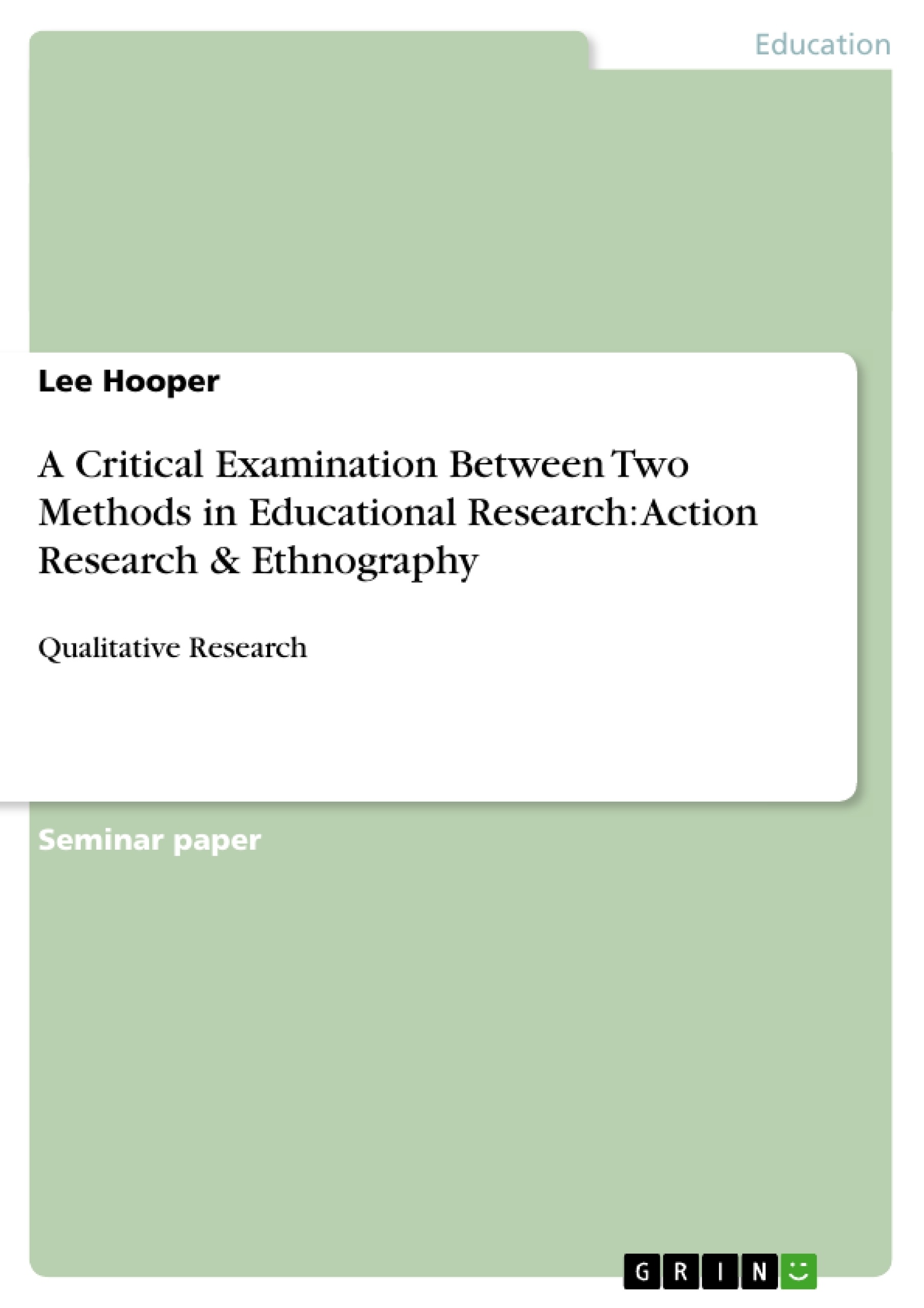Excerpt
Action Research – Introduction & Definition
Action Research (AR) is a term used to denote a methodical system of investigation and reflection, performed by individuals for their own professional practice and development (Costello, 2011, pp. 6-7). It encompasses a social philosophy that is centered on acquiring practical knowledge that can be applied to concrete situations (Punch, 2009, p. 136). The goals of AR can be generalized into three potential outcomes: “Improving practice, improving understanding of practice, and improving the situation in which the practice takes place” (Atkins & Wallace, 2012, pp. 126-127).
Key Concepts & Distinctive Features
AR is defined as a cyclical process, with each new piece of information generating new ideas and new questions (Punch, 2009, p. 136-7). There are numerous variations to illustrate the logical steps used in AR, with many including combinations of circles or spirals (Costello, 2011, p. 8). Kemmis and McTaggart (2000, p. 595-596) describe AR as first preparing for an adjustment, then once initiated, observing the results with a reflective attitude. Once this is done the cycle is repeated with the incorporated knowledge of the previous change made. Bassey (1998, pp. 94-95) outlines a more sophisticated eight stage model, revolving around three central themes: exploring the educational environment (Stage 1-4); implementing changes (Stage 5); observing and analysing the changes (Stage 6-8). Costello (2011) summarizes this process stage by stage below:
Stage 1: Defining the enquiry.
Stage 2: Describing the educational situation.
Stage 3: Collecting and analysing evaluative data.
Stage 4: Reviewing the data and looking for contradictions.
Stage 5: Tackling a contradiction by introducing some aspect of change.
Stage 6: Monitoring the change.
Stage 7: Analysing evaluative data concerning the change.
Stage 8: Reviewing the change and deciding what to do next. (p. 10)
AR can be divided into three specific approaches: Practical AR, critical AR, and participatory AR. Practical AR entails devising pedagogical methods in applied settings that directly benefit both teacher and student (Manfra, 2009, p. 32). Critical AR focuses on the examination of social and political influences on the educational environment, so that underlying issues of inequality may be addressed and resolved. Participatory AR is centered on collaborating with participants as equals or colleagues, so that the group can form contextual approaches to increase localized knowledge that can be put into action (Whyte, 1989, pp. 368-369).
Role of the Researcher
Cohen, Manion & Morrison (2007, p. 303) point out that there are two generalized camps in AR: that of the reflective practitioner, who seek to affect change on the micro-level, such as the classroom, and that of the critical theorist, who look towards implementing change on a macro-level, such as changing national school policies. Depending on where in this spectrum the researcher sits, their roles will differ, however, regardless of their position, both researchers will generally be looking to empower those that they are researching.
Those involved in AR are typically not outsiders attempting to gain access to educational matters, but rather insiders who are in some way accountable for what goes on within the educational environment (Sheehy, 2005, p. 205). As insiders who have access to a wider range of connections, there is a heavy emphasis on collaboration. One role of the researcher will be to share information with teachers, students, and other researchers (Cohen et al, 2007, p. 299). The significance of collaborating is that by involving those around who may be on the periphery of your practice, either affecting it directly or indirectly, a more holistic and permanent change is likely to occur. Furthermore, by involving others in this way, AR will likely have a more emancipatory result.
Main Data Collecting Techniques
In AR there is an eclectic approach to collecting raw data, with techniques ranging from a field journal, collecting electronic materials, using sources such as class records, analytic memos or repertory grids, to standard collecting techniques such as questionnaires, surveys, and interviews (Craig, 2009, p. 138; Waters-Adam, 2006, Part 1, Methods, para. 4). One of the defining characteristics about AR is that there is a constant analysis of data throughout the research, which restructures the direction of the study and consequent analysis of further data (Mertler, 2006, p. 28). As a result of this continual examination, the researcher needs to have a structured and logical approach to continual data analysis, since each cycle depends on the analysis and completion of the previous cycle (Atkins & Wallace, 2012, p. 139). In order to identify and note the most relevant information, the researcher may use inductive analysis, where “important patterns and themes are ordered to construct some sort of framework” (Mertler, 2006, p. 125). This can be done through a three step process of “organization, description, and interpretation”, which will involve some sort of coding scheme to categorize information in a more manageable way (Parsons & Brown, 2002).
[...]
- Quote paper
- Lee Hooper (Author), 2013, A Critical Examination Between Two Methods in Educational Research: Action Research & Ethnography, Munich, GRIN Verlag, https://www.grin.com/document/262264
Publish now - it's free























Comments